This article first appeared in Explore Magazine 2016 and is published with permission.
A famous proverb says:
‘Give a man a fish and he’ll eat for a day. Teach a man to fish and he’ll eat for a lifetime.’
Recently, we’ve added a third part:
‘Train a man to organise and his community will feast for ever.’
However, in our part of London, the problem isn’t about having fish to eat – it’s about having a home to live in. Soon after Naomi and I arrived at Ilford Salvation Army, I met a man called Mustafa who had been an accountant. When I met him he had been on the street for a couple of days and came to us for help. What followed was a crash course in navigating bureaucracies. I met Mustafa at around 10 am. It was around 11 pm when I had to say to him: ‘I’m sorry, Mustafa. Here’s a sleeping bag. Come back in the morning.’
I had never felt so powerless in my life.
Power – which in community organising is defined as the ability to act – is the fundamental component of bringing about any sort of change you want to see. We could only make as much change as we had the power to compel.
Give a man a fish – Give a man a bed
People often come to Ilford Salvation Army because we are immediately next door to the council’s Housing Advice Centre. They come to us if they haven’t got the answer they wanted. Too often we can just give someone a sleeping bag and make a referral to set them on the path to finding appropriate support, as with Mustafa. After meeting him, however, in November 2011, we discovered a group of other Christians looking to establish a winter night shelter, following the deaths of two rough sleepers the previous year. Somewhere was needed to host the shelter, and with a large upstairs hall used only for storage, we offered our building as a venue.
Within weeks, 25 men and women were sleeping in sleeping bags on foam mats in our upstairs hall. Soup was served each evening and donations of clothing given out. It was basic, but it kept people alive. Over four winters, over 300 people have stayed at the night shelter. Each guest can tell their own story of the chain of events that led them to sleeping rough on the streets.
The shelter is only possible because of the commitment of over 150 volunteers from a wide range of backgrounds. Salvationists are joined by members of other churches: Catholics, Baptists, Pentecostals, Methodists and non- denominational. We are joined by people of other faiths and none. The current volunteer team includes Muslims, Sikhs, Jews, atheists and agnostics. We are a diverse community brought together to meet a common need. I’ve experienced more meaningful unity of the Body of Christ at the night shelter than I have in any other ecumenical setting.
Teach a man to fish – Help him find a home
A couple of years into the life of the night shelter, we realised that we shouldn’t just be giving people food and a bed. Lifesaving though this was, the night shelter needed to be a base for people to get their lives back on track and move on to a home of their own. We began convening a meeting between different local organisations to discuss what options there were for each person.
Unfortunately not everyone can move on. Last winter less than a fifth of our guests moved on to a more stable environment, whether rehab, hostel or flat. For some, their options are limited by having no recourse to public funds. For others, the obstacle is the lack of genuinely affordable housing in our borough. With the lowest stock of council housing of the London boroughs, people in Redbridge are dependent on private landlords. Rents are much higher than the local housing allowance, which means that people we have worked hard to build relationships with are moving out of the borough. This is true not just for people staying in the shelter, but also for families at our toddler group, and people who consider The Salvation Army their church. Suddenly, we all became aware that the housing crisis isn’t affecting just a niche group of homeless people. It is affecting our families and our friends. It is ripping the heart out of our community.
Train a man to organise – Building a community
Ilford Corps is a member institution of Redbridge Citizens, the local chapter of community organising alliance Citizens UK. Citizens UK is an alliance of over 350 schools, churches, mosques, synagogues, unions, youth groups and universities committed to social justice and the common good. Self-identifying as a ‘power organisation’, Citizens UK trains local institutions in the practice of community organising, so that with their neighbours they have the power to challenge politicians, councils and businesses. By building power, people can change their neighbourhoods, cities, and ultimately the country for the better. At Ilford Salvation Army, we realised we needed to get serious about organising if we were to make the change we wanted. The local elections of 2014 provided an opportunity to take action.
On Tuesday 6 May 2014, 93 citizens met at Ilford Salvation Army hall to hold a public negotiation with the three electoral candidates for leader of Redbridge Council. The three councillors were pressed by this diverse assembly to make commitments to pay a living wage to all care workers, create a private landlords register, explore the possibility of a Community Land Trust (CLT) in the borough, and to meet regularly with Redbridge Citizens to work together in addressing the issues raised at our assemblies.
A lot of hard work had gone into the assembly: negotiations with politicians; a script carefully crafted; conversation convincing members to turn up. This was just the beginning. We didn’t ask the politicians to do something for us; we asked them to do something with us. Months later, a small delegation met the newly elected Leader and Deputy Leader of the Council to follow up on their commitments, including exploring developing a community land trust (CLT).
A CLT is a way to develop genuinely affordable housing by taking the land into the shared ownership of the community. This removes the inflationary considerations of the land value from the cost of rent or purchase, meaning they can instead be linked to the median income of a given area. Stepney Salvation Army, through Citizens UK, had already been involved in pioneering the first urban CLT in the UK, and we believe that developing one within our borough will benefit local people struggling to find affordable places to live.
After months of public actions, we engaged with the borough’s Fairness Commission and succeeded in getting them to recommend that two parcels of land be allocated towards large-scale CLTs. In November 2015, we went to a council meeting at the town hall. We filled the public gallery with 80 of our members and stood together to table a question to seek the Leader of the Council’s endorsement of the CLT. He committed to attending another assembly in February 2016 where we would celebrate signing up 300 new shareholders of the CLT – the #Pound4Power campaign. The night shelter guests have all signed up as shareholders, and one of the guests at the night shelter has signed up nearly 60 new shareholders on her own!
Conclusion
Matthew 25:34-36 says: ‘Come, you that are blessed by my Father, inherit the kingdom prepared for you from the foundation of the world; for I was hungry and you gave me food, I was thirsty and you gave me something to drink, I was a stranger and you welcomed me, I was naked and you gave me clothing, I was sick and you took care of me, I was in prison and you visited me’ (NRSV)
A key aspect of these verses is that the situation is transformed. For example, the one who is hungry is fed. In other words, the homeless person gets a home – not homeless any more! What if we go a step further and recognise that one of the roots of each of these situations is the incapacity to act? Perhaps it’s also appropriate to say, ‘I had no power, but you trained me how to take it back’, so that there’s a fighting chance in that struggle ‘against the rulers, against the authorities, against the powers of this dark world and against the spiritual forces of evil in the heavenly realms’ (Ephesians 6:12 NIV).
My dream for Ilford Salvation Army is that it will not just be a community where lives are saved (though it is), where a community comes together to meet a common need (though it is) and where those sleeping rough come to realise that they are valued and loved by our community (though, again, it is) – but that it will be a place where people find the capacity to act – that power might be built.
Continue reading “Give, Teach, Train: how one Salvation Army Corps is organising for justice”

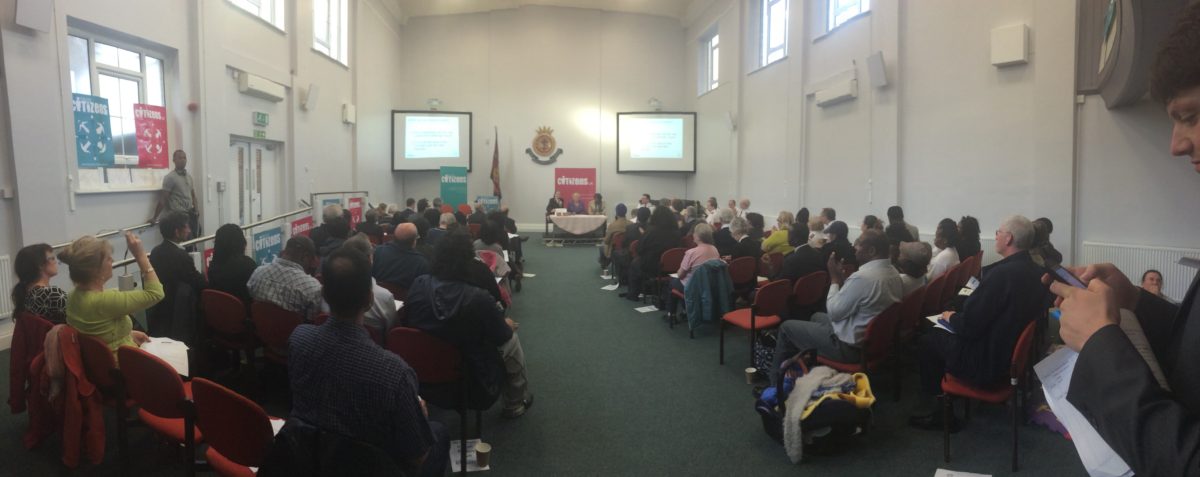
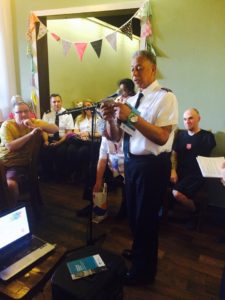 In terms of theological, devotional and motivational material urging us forward in the fight we have never had it so good. The biblical mandate for action is being preached with new fervour in the light of austerity, political upheaval and the refugee crisis. Resources are plentiful – campaign material regularly finds its way into our letterbox, email inbox and social media feeds. Dutifully we follow the instructions to pray, fundraise, get informed and click on the link to another petition website. Online activity in the cause of social change has led to the coining of a new word – ‘clicktivism’. Apparently we’re clicking like we’ve never clicked before. Yet beneath it all comes that nagging question – is any of this really making a difference? It all feels so detached. There’s surely more to justice-seeking than this.
In terms of theological, devotional and motivational material urging us forward in the fight we have never had it so good. The biblical mandate for action is being preached with new fervour in the light of austerity, political upheaval and the refugee crisis. Resources are plentiful – campaign material regularly finds its way into our letterbox, email inbox and social media feeds. Dutifully we follow the instructions to pray, fundraise, get informed and click on the link to another petition website. Online activity in the cause of social change has led to the coining of a new word – ‘clicktivism’. Apparently we’re clicking like we’ve never clicked before. Yet beneath it all comes that nagging question – is any of this really making a difference? It all feels so detached. There’s surely more to justice-seeking than this.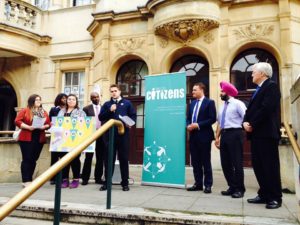 The beginning of justice-seeking is neither an action nor a programme. As an officer once reminded me: ‘We don’t do social justice – we live justly.’ In Salvation Army theology it springs from our holiness teaching, where the inner life of a believer, orientated around a relationship with God, spills over into public life. Faith may be personal but it’s never private. The inner working of our hearts is manifested in hundreds of actions and decisions we make every day. Living a just life begins with how we treat others, who we include, how we use our wealth and time. This applies to those closest to us, neighbours and work colleagues, our corps family and, by extension, the whole of humanity. The rather wonderful truth I’ve discovered is that the more I’ve chased personal holiness the more compelled I’ve been to seek a just world and the more justice-seeking I’ve engaged with the more convicted I’ve been about personal transformation.
The beginning of justice-seeking is neither an action nor a programme. As an officer once reminded me: ‘We don’t do social justice – we live justly.’ In Salvation Army theology it springs from our holiness teaching, where the inner life of a believer, orientated around a relationship with God, spills over into public life. Faith may be personal but it’s never private. The inner working of our hearts is manifested in hundreds of actions and decisions we make every day. Living a just life begins with how we treat others, who we include, how we use our wealth and time. This applies to those closest to us, neighbours and work colleagues, our corps family and, by extension, the whole of humanity. The rather wonderful truth I’ve discovered is that the more I’ve chased personal holiness the more compelled I’ve been to seek a just world and the more justice-seeking I’ve engaged with the more convicted I’ve been about personal transformation.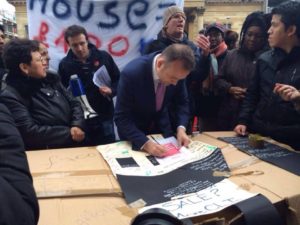 While justice begins with God, it clearly involves people. In the Exodus story the groans of the Israelite slaves rise up before God and initiate a social justice movement (Exodus 2:23–25). In today’s world we constantly hear the groans for ourselves – the low-paid worker at the food bank, the refugee, the homeless and the discriminated against. Most of us long to end such suffering. The uncomfortable truth, however, is that real justice-seeking compels us to move to the edges and experience first-hand the sufferings of others before we can act. There really is no other way. Of course when we get there we discover God is well ahead of us.
While justice begins with God, it clearly involves people. In the Exodus story the groans of the Israelite slaves rise up before God and initiate a social justice movement (Exodus 2:23–25). In today’s world we constantly hear the groans for ourselves – the low-paid worker at the food bank, the refugee, the homeless and the discriminated against. Most of us long to end such suffering. The uncomfortable truth, however, is that real justice-seeking compels us to move to the edges and experience first-hand the sufferings of others before we can act. There really is no other way. Of course when we get there we discover God is well ahead of us. Once personally involved in the sufferings of others, it is tempting to offer charity and stop there. We meet the need, bandage the wound and move on. Most likely people will call us saints.
Once personally involved in the sufferings of others, it is tempting to offer charity and stop there. We meet the need, bandage the wound and move on. Most likely people will call us saints.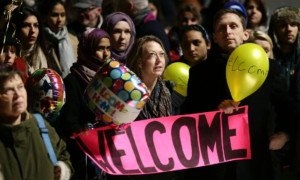 The final stage is to move from a protest voice on the margins into the corridors of power, where decisions are made. Forcing your way into this space can happen only when we organise ourselves to be powerful enough for decision-makers to take notice. This is the work of politics – not party politics – but community-based, people politics. And this is where corps and centres come into their own. After all, we know our communities and, in most cases, we have been a constant presence for generations. Almost every local expression is connecting directly with those who suffer injustice and, crucially, we are collectives who exist to transform the world! In a society where institutional
The final stage is to move from a protest voice on the margins into the corridors of power, where decisions are made. Forcing your way into this space can happen only when we organise ourselves to be powerful enough for decision-makers to take notice. This is the work of politics – not party politics – but community-based, people politics. And this is where corps and centres come into their own. After all, we know our communities and, in most cases, we have been a constant presence for generations. Almost every local expression is connecting directly with those who suffer injustice and, crucially, we are collectives who exist to transform the world! In a society where institutional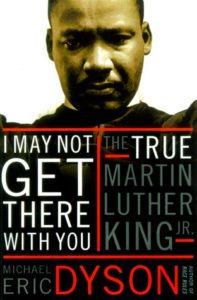 Whilst much has been written about the life and work of Martin Luther King Jr. this is a book that goes beyond autobiography to assess the legacy of King in America today.
Whilst much has been written about the life and work of Martin Luther King Jr. this is a book that goes beyond autobiography to assess the legacy of King in America today.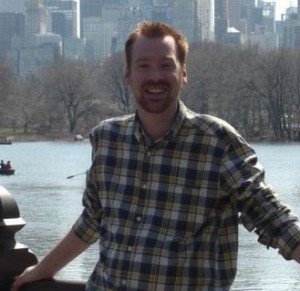 Tom Underwood teaches young people with autism and writes plays about peace. He is currently writing about peace activism and arms trade activists. He worships at
Tom Underwood teaches young people with autism and writes plays about peace. He is currently writing about peace activism and arms trade activists. He worships at 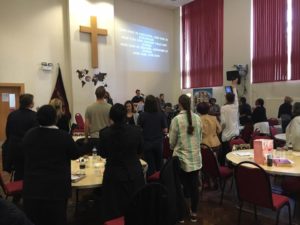 In 1912, General William Booth, founder of The Salvation Army, entered the Royal Albert Hall in London to give his last, most notable address to a packed crowd of 7,000 Salvationists. The most famous part of this speech is:
In 1912, General William Booth, founder of The Salvation Army, entered the Royal Albert Hall in London to give his last, most notable address to a packed crowd of 7,000 Salvationists. The most famous part of this speech is: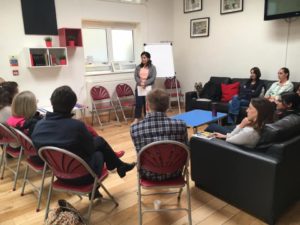 So the justice conference “While Women Still Weep” held at Southwark Corps recently was my effort to do something. An effort to bring awareness to others, to create a day, a moment where God could speak and stir our hearts to action. We had speakers from International Justice Mission talking about the international efforts being made to rescue and restore, we had speakers from local Salvation Army chapters like Faith House and the Territorial department for Anti Human trafficking to give us information on local situations and how we could join the fight. A representative from Citizens Uk was there to speak about the importance of listening to people’s stories and Stephanie Chagis Bijl talked about joining the justice fight through prayer.
So the justice conference “While Women Still Weep” held at Southwark Corps recently was my effort to do something. An effort to bring awareness to others, to create a day, a moment where God could speak and stir our hearts to action. We had speakers from International Justice Mission talking about the international efforts being made to rescue and restore, we had speakers from local Salvation Army chapters like Faith House and the Territorial department for Anti Human trafficking to give us information on local situations and how we could join the fight. A representative from Citizens Uk was there to speak about the importance of listening to people’s stories and Stephanie Chagis Bijl talked about joining the justice fight through prayer. It was a day where hopefully people came away with some practical tools and ideas on how they could join the fight. Once you know, you can no longer stand back and do nothing.
It was a day where hopefully people came away with some practical tools and ideas on how they could join the fight. Once you know, you can no longer stand back and do nothing.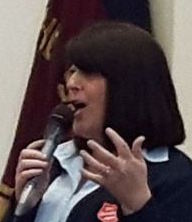 Sandra Pawar is currently the Corps Officer at Southwark Corps. She is passionate about seeing broken lives made whole, captives set free and chains of injustice broken.
Sandra Pawar is currently the Corps Officer at Southwark Corps. She is passionate about seeing broken lives made whole, captives set free and chains of injustice broken. 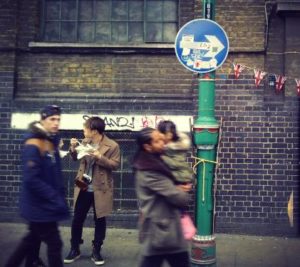 By Nick and Kerry Coke
By Nick and Kerry Coke By Andrew Manley
By Andrew Manley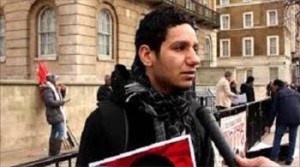 response from government authorities was brutal. Sayed was severally beaten leaving a permanent scar across his forehead. He was imprisoned for six months during which time he was regularly beaten, sexually harassed and tortured. Finally, he was given two choices; stay in Bahrain and remain in prison or leave the country he loves. In July 2012 he claimed asylum in the UK.
response from government authorities was brutal. Sayed was severally beaten leaving a permanent scar across his forehead. He was imprisoned for six months during which time he was regularly beaten, sexually harassed and tortured. Finally, he was given two choices; stay in Bahrain and remain in prison or leave the country he loves. In July 2012 he claimed asylum in the UK.
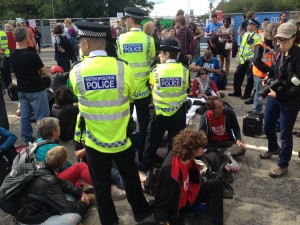 In September 2015 I joined with others to protest outside the Excel Centre in East London as it hosted DSEI, the largest arms fair in the world. On that day Sayed was one of many international speakers, all from countries where the UK sells arms despite oppressive human rights regimes. Many of these speakers used the word ‘solidarity’ to describe the impact of us standing alongside them in their struggle for human rights.
In September 2015 I joined with others to protest outside the Excel Centre in East London as it hosted DSEI, the largest arms fair in the world. On that day Sayed was one of many international speakers, all from countries where the UK sells arms despite oppressive human rights regimes. Many of these speakers used the word ‘solidarity’ to describe the impact of us standing alongside them in their struggle for human rights.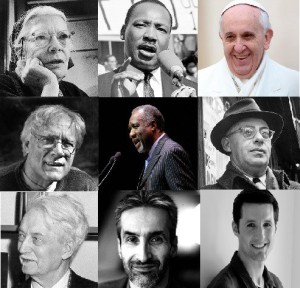 By Sam Tomlin
By Sam Tomlin
 I belong to a Corps which has a rich heritage of vibrant Salvationism. A quick look through the history books of Sydney Congress Hall Corps shows long-term discipleship, enthusiastic evangelistic outreach, strong community, innovation in worship, musical excellence, and a strong engagement with social issues. Sydney Congress Hall has much to be proud of in its history. Yet the history means little if we do not draw on it to impact the present. As
I belong to a Corps which has a rich heritage of vibrant Salvationism. A quick look through the history books of Sydney Congress Hall Corps shows long-term discipleship, enthusiastic evangelistic outreach, strong community, innovation in worship, musical excellence, and a strong engagement with social issues. Sydney Congress Hall has much to be proud of in its history. Yet the history means little if we do not draw on it to impact the present. As